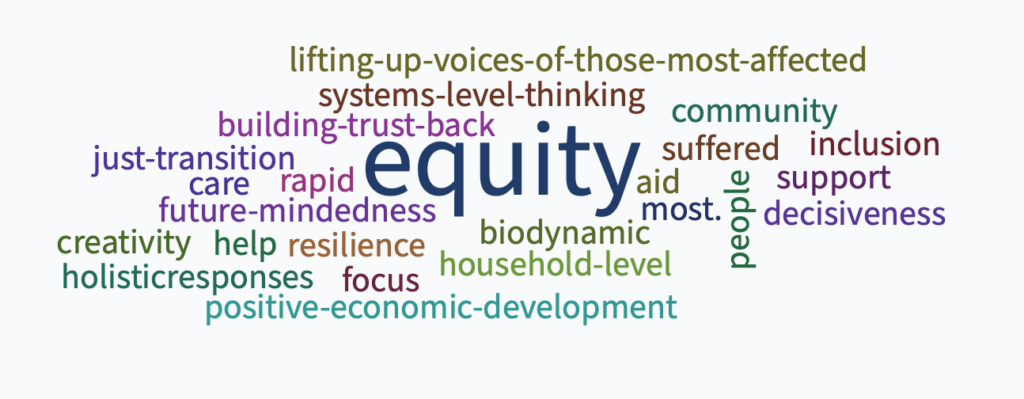At our February Community Meeting on Tuesday night, we launched our Examining Climate blog series by discussing two critical topics related to climate change: a Just Transition and renewable energy.
CCJ Campaign Manager Sarah Martik kicked off the meeting by explaining that the climate crisis is real, human-induced, and that it’s impacting communities right now. Soon after, attendees were asked two questions, and their responses were used to generate word clouds. Below are the two word clouds that were generated from participants’ answers to these questions.
When people were asked “What do you think of when you hear “climate change,” “global warming,” or “climate crisis?”, the following word cloud was produced:

Next, the audience was asked “What is most important when thinking through solutions to the climate crisis?” This was the resulting word cloud:

It is interesting that the top concepts in the word clouds are ‘future’ and ‘equity’. We have the future ahead of us, and we help to decide what that’s going to look like by our present actions. What do we want to make of it? When thinking through solutions to the climate crisis, it is true that all discussion must center equity and justice: people and planet, rather than profit, must be our top priorities.
We continued the meeting by discussing what is meant by a Just Transition, and then went on to examine the positive aspects as well as the hurdles that we have to overcome with renewable energy. Copper mining was used as a case study, and to further illustrate, we talked about Oak Flat, Arizona, the sacred ancestral land of the Apache people. This territory is at risk of being transferred by the US Forest Service to a subsidiary of Rio Tinto to open the Resolution Copper Mine. It is unknown what’s going to happen with this, but it is an environmental justice issue. Part of what we always advocate for is for those most impacted to be involved in decision-making, for harms to be minimized, and for public and environmental health protections.
Confronting the climate crisis does not mean that the end justifies the means.
Applying the Just Transition framework does not mean that we can’t have any kind of development.
The extractive economy that has dominated our landscape for hundreds of years has relied upon people being split apart. Coming together to discuss and work through issues is regenerative in itself, and we felt this on Tuesday evening.
*****
For the first half of the year, CCJ staff members will be sharing their favorite (or least favorite) climate solution, looking at the benefits and the costs in the hope of sparking an honest conversation about how we address the climate crisis and keep our focus on environmental justice. The first of these topics was covered in You Can’t Solve the Climate Crisis without a Just Transition, written by our Executive Director Veronica Coptis.
If you’re interested in contributing to this blog series, feel free to email us at info@centerforcoalfieldjustice.org with “Examining Climate” in the subject line. We also welcome blog submissions about other topics, too, for our What’s On Your Mind series.
